QuestionI found a baby kitten about a week old, eyes and ears still closed. She had been left by the mother. I took her in and have had her about 3 weeks now. She has been having some yellow discharge out of her eyes for about a week and now today she has started having discharge from where she goes pee. It as well is a yellowish. I am kinda concerened, what would cause this and is it anything I need to be worried about?
AnswerLaurel,
This little one needs to be examined by a vet. During the first few weeks of a kitten's life their eyes are maturing and developing and an eye infection can cause serious damage to her vision. It sounds to me as though this little baby is due for a complete physical examination including blood work (to assess her health and how her organs are functioning), a urine test (to check for infection), deworming (kittens are generally born with intestinal parasites). The yellow discharge from her vagina could indicate a number of serious things like a very severe urinary tract infection. There is a small possibility that your kitten may have a uterine infection which I must admit I haven't seen too much of in kittens of this age.
It's important to be sure that young orphaned kittens receive care that is as close as possible to what their mother would have provided for them. This means that we have to be surrogate parents for kittens who are instinctively expecting to be cared for the way that mom would have done. Kittens between the ages of birth and 3-4 weeks of age(depending on how fast the kitten matures)require stimulation to urinate because their mother would generally be licking their bottoms and genitals to stimulate urination and defecation. It's important to understand that while a kitten's bladder and bowels will often eventually empty without proper stimulation, they would only do so because the bladder and bowels would essentially overflow. The problem with allowing urine to sit in the bladder for more than a couple of hours is that it actually increases the likelihood that bacteria will begin to grow and cause an infection that left untreated can cause life threatening problems for any cat, but especially a young kitten. The closest way to imitate the stimulation that a mother cat would give her kittens in order to encourage them to urinate and defecate is to use a cotton ball moistened with warm water and wipe the kitten from their genitals to their bottom. If the kitten is wiped from her bottom to her genitals there is a chance that she may have gotten some fecal bacteria in her urinary tract or vagina which can cause a serious infection.
Since your kitten was abandoned either by her mother or a person who simply didn't want her she has special needs. Kittens that have been hand raised don't have the same level of immunity to help them fight off viral and bacterial infections. Antibodies would normally be passed to the kittens through their mother's milk and these immunities would normally be active until mom weaned the litter. Unfortunately this kitten didn't get much in the way of immune support because she's been hand raised. Kittens that have been hand raised are usually more vulnerable to viral and bacterial infections because of their immature immune system. Simple things can cause serious problems. I routinely recommend that anyone handling any kitten who hasn't been vaccinated washes their hands before and after handling to avoid accidentally passing on viral or bacterial infections from other animals. If a kitten's bladder is allowed to empty as a result of overflow there is a good chance that he/she would be susceptible to kidney and bladder infections. If kittens are stimulated to use the toilet by being wiped from back to front rather than front to back fecal bacteria can end up in the reproductive/urinary tract. Mother cats normally keep their kittens very clean, in fact kittens are bathed at every opportunity by their mother. A kitten that has been hand raised may not have the advantage of having mom bathe him/her, but for the first several weeks using a cotton ball just barely moistened with warm water and starting to bathe the little one at the face, working down the back and wiping under their chin, their chest and working towards their bellies should suffice. Kittens under 6-8 weeks of age shouldn't be bathed using flea control shampoos or regular kitten shampoo except on the advice of your vet.
Kittens that are hand reared depend very much on their human caregivers to ensure that their exposure to viruses and bacteria is minimal. Human caregivers raising kittens must be aware that they are attempting to recreate a mother cat's loving care. Mother cats are normally very attentive and provide everything that their litter needs including antibodies, food, warmth, protection, physical contact and love. Caring for orphaned kittens requires a lot of time, patience, ability to function with little to no sleep and a focus on providing necessities of life like the best possible nutrition (commercially available formulas like mammalac, KMR Just Born are specifically formulated for orphaned kittens and are as closely matched to the milk that the kittens would receive from mom as it's possible to get. Young kittens must be stimulated to urinate and defecate after each feeding to lower the risk of infection. Young kittens must also be kept warm, gently handled before, during and after feedings to facilitate a good bond and it's also very important to be sure that everyone who handles the kittens prior to them being vaccinated washes their hands thoroughly in hot, soapy water before handling the little ones.
Given the kitten's very young age it's important to realize that an untreated urinary tract infection could potentially cause serious secondary health issues including a kidney infection which could potentially be fatal. A uterine infection can pose a very serious problem because the uterine horns could fill with pus and burst which could spread infection throughout her internal organs. (This outcome would most likely be fatal.) The way that a vet cures a uterine infection is to spay the cat/kitten and place them on a course of antibiotics to clear up any remaining infection. Since this kitten is so young it's important to be aware that if your vet finds a bladder, kidney or uterine infection he/she will most likely recommend that the kitten be admitted to the hospital for a course of antibiotics. In the event that such a serious health issue is found your vet may very well recommend supportive care which depends on the actual diagnosis. Kidney issues may require a special low protein diet, at least for a few days to allow the kidneys to operate on cruise control. IV or subcutaneous fluids and observation at the vet clinic may well be part of the treatment plan. The sooner this baby is examined and treated the better her chances of recovering and doing well in the long term are. In my experience by the time that you realize that your cat/kitten isn't well they are actually much sicker than they look so I would recommend that this kitten sees a vet tomorrow at the latest so that she can receive proper treatment for her health issues.

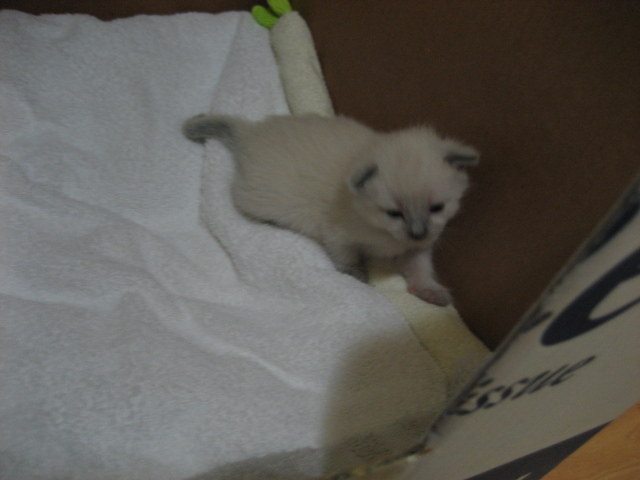 is my kitten blue or blue cream point?
Question
polar bear
hi Jessica, our mommy cat is a blac
is my kitten blue or blue cream point?
Question
polar bear
hi Jessica, our mommy cat is a blac
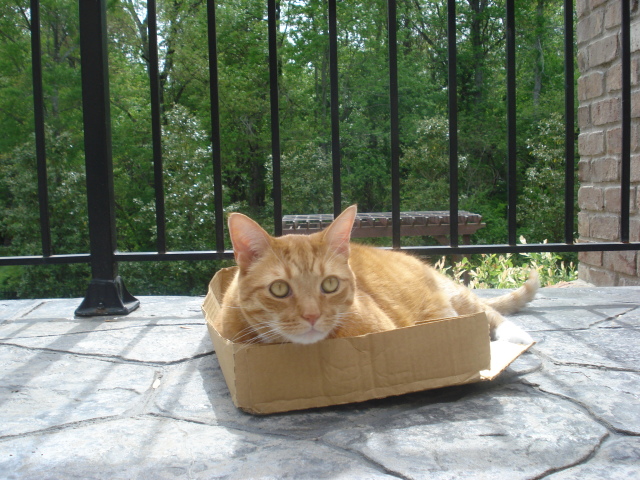 Im terrified... my cat may be dying
Question
My Edward
First of all I want to thank you for
Im terrified... my cat may be dying
Question
My Edward
First of all I want to thank you for
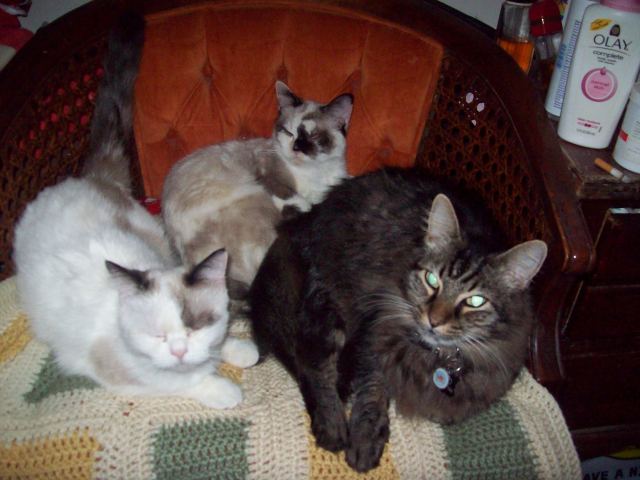 Litter Box Behaviour
Question
All Kitties
Hello!
Im writing to you fo
Litter Box Behaviour
Question
All Kitties
Hello!
Im writing to you fo
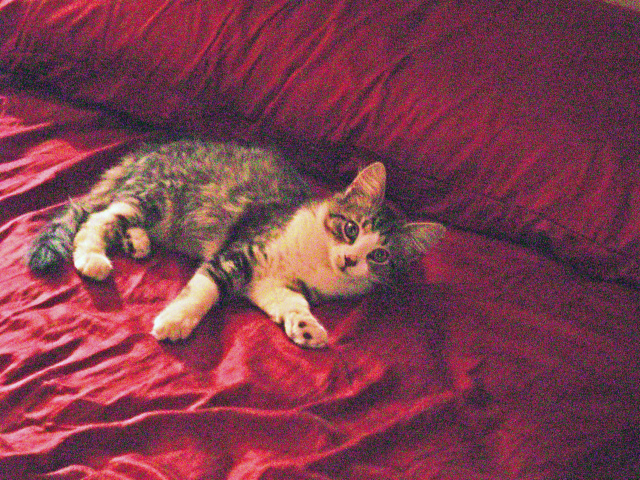 Additional info about the possbile norwegian
Question
Edmund at 4 months
I forgot to mention. Edmund
Additional info about the possbile norwegian
Question
Edmund at 4 months
I forgot to mention. Edmund
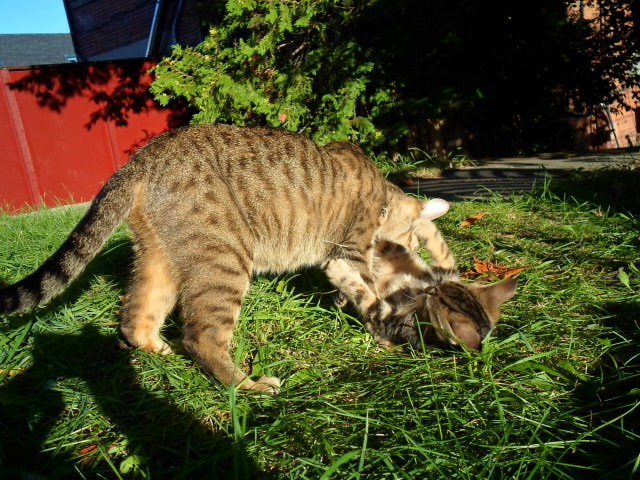 Cat Breed Identification?
Question
Playtime Pretty Girl
Hi there. &n
Cat Breed Identification?
Question
Playtime Pretty Girl
Hi there. &n